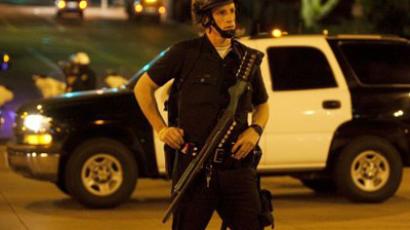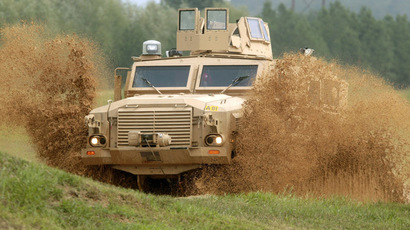‘Welcome to Police Industrial Complex’ – former Philly commissioner
Dangerous, alienating, and sociopathic: the policy of arming police to the teeth with military-grade gear shows a fundamental misunderstanding of how crime is solved and what it means for a cop to walk the beat, former Captain Ray Lewis told RT.
Nine-foot tall, 55,000 pound, Mine-Resistant Ambush Protected (MRAP) armored-fighting vehicles rolling through the streets of America.
Millions of dollars’ worth of military gear being distributed to local police forces on an annual basis.
Drones, M-16s and so many other hand-me-downs from over a decade of war making their way from US forces abroad to a local police force near you.
If you really believe any of this is making you safer, Lewis, who spent 24 years on the force, says you should think again. Endangering lives, alienating communities, turning minority neighborhoods into occupied territory and compromising the very ability for police to do their jobs; these are just a few of the reasons the former commissioner believes main street is being sold down the river for power-hungry cops and ruthless corporate interest.
RT:Why is this considered to be a good idea, bringing these high caliber weapons into US streets?
Ray Lewis: I don’t think it’s a good idea. High caliber weapons are extremely dangerous. They have a very high ricocheting velocity, and that means that innocent people are going to get killed and injured. They can go through doors, they can go through cinder block, they can go through metal car doors, and this type of velocity is not necessary. I spent 24 years in the Philadelphia Police Department.We upgraded our Smith and Wessons to Glocks, which are a very powerful pistol that work very well. There is no reason to have anything stronger than that, except in exigent circumstances, in which your SWAT team does have that type of weapon. For anyone else, they’re not necessary and they’re dangerous.
RT:You know Captain, one might ask, will this equipment not obscure the line between soldier and police officers, especially in those small communities where they’re already being distributed?
RL: Yes, it will obviously obscure the line between the military and the police. But I’m not at all concerned with small communities that you mentioned. I’m concerned with the large cities, where you have large minority populations living in economically depressed areas. That’s where you’re going to have problems. You bring this type of equipment into a minority area, you are going to make those people feel as if they are living in an occupied territory. You’re going to alienate them.
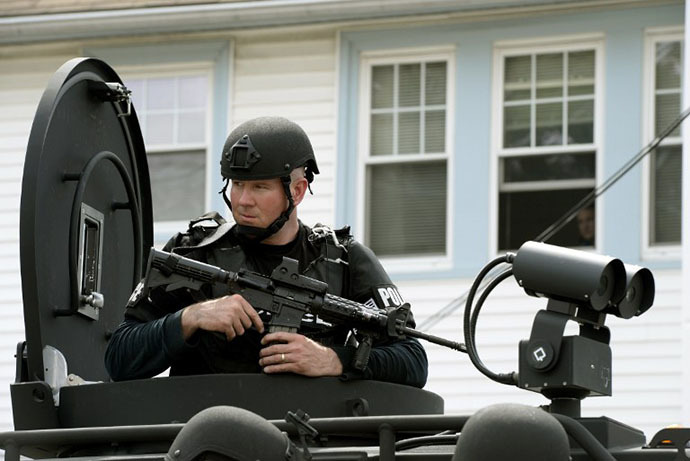
"...innocent people are going to get killed and injured."
What happens is, you get a halo effect. A halo effect means that that alienation transfers to all the other officers in that department. That alienation transfers to the officers in the patrol cars, the officer on the foot beat, the officers in the community relations division. So bringing that type of equipment is going to alienate people from all parts of the police department. What people don’t know is that input from community members is one of the most important ways crimes are solved. They know the bad guys in the area, they hear the rumors, they hear the gossip, they know what’s going on in their communities. Too many people think that crime is solved through high-tech forensic labs or exemplary investigative work. Not true, although these two come in very handy in many cases, most of your information about crimes comes from the community. You bring this military type of mindset into the community, you’re not going to get the interaction from the members of that community.
RT:Some police officers have said it is necessary to have this type of equipment, especially if you’re covering a protest and it gets out of hand, where police officers can get injured or shot. Isn’t it a good idea, in some ways, to have such equipment at your disposal?
RL: That is the worst idea I could think of, to have high caliber weapons at a protest. Think of Kent State, where they shot and killed so many innocent people. And they were not high caliber weapons. Can you imagine the massacre that would take place if officers had high caliber weapons? I spent a year in New York City supporting the Occupy [Wall Street] message. I was arrested down there for civil disobedience and never did I see any type of behavior from those protesters that would ever need any type of weapon, let alone high caliber. If anything, it was the protesters that would have needed high caliber weapons.
"You bring this type of equipment into a minority area, you are going to make those people feel as if they are living in an occupied territory."
RT: Let me talk about the gear itself. It’s been used in certain war zones and then come back home, as there’s no longer any need for it there. What should they do with this type of equipment if they can’t distribute it to local police forces? What happens if people come out and say, ‘actually, we don’t want these types of vehicles on our streets. We have kids, we can’t have them here, we’d much rather go back to a much more local form of policing that we’re more comfortable with?’
RL: Obviously, you have to listen to the community. The police serve the community; they don’t serve us, we serve them. If they want to go back to a more conventional police force that they feel comfortable with, then that’s what has to be done. It’s imperative.
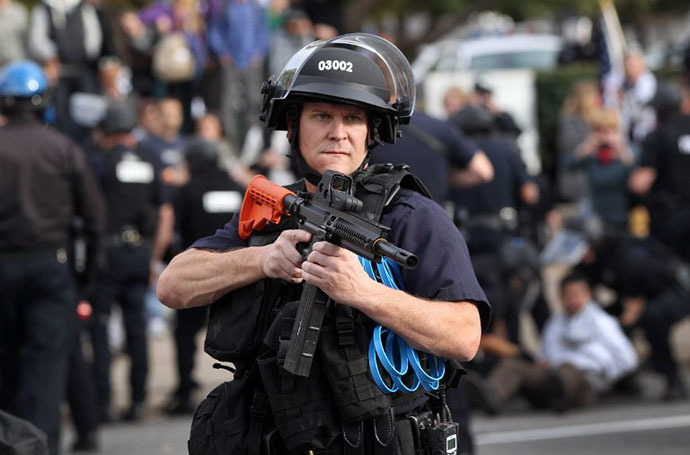
RT:So what happens to the equipment then, at that point?
RL: It can be sold to other countries or destroyed. I’d have no problem with them destroying that equipment whatsoever instead of using it in this country. See, that equipment can be very dangerous if it falls into the wrong hands. Let me explain.
There are three types of people who join the police department, basically: one joins because of a need for a job that can give him or her a comfortable lifestyle; the second person joins because they want to serve and protect the public; the third type of person joins because they love the power and the control. When you have a person that joins because they love the power and control, how do they get more power and control? They move up the chain of command until they reach police commissioner. Now once they reach police commissioner, how do they gain more power and control? And this is a sociopathic tendency by the way. It’s insatiable; they can never get enough power and control, just like a billionaire can never get enough money.
So, you reach the top rung of the ladder, you’re a police commissioner, and you want to gain more power. How do you do it? You acquire all of this military weaponry, the semi-tanks, the MRAPs, the spy drones, and what not. And I guarantee you, once you purchase them, they’re not going to sit in a warehouse. That police commissioner is going to use them. And I’m very fearful of these types of police commissioners using that equipment. Let me give you the perfect example of what I’m talking about.
"It’s insatiable; they can never get enough power and control..."
The Philadelphia Police Commissioner Charles Ramsey, he was not commissioner when I worked there, but when I attended the Occupy movement and was arrested for civil disobedience, several days later I received an unbelievably threatening letter from him. He told me, he informed me to stop wearing my uniform. It was an order. I’d retired 10 years previously; he had no power over me. Yet he was so power and control hungry, he tried to order me to stop wearing that uniform. What was most egregious about this letter, I have it for proof, is he informed me that if I continued to wear the uniform, he would take any and all necessary action to stop me. That is the epitome of a sociopath whose desire for power and control is insatiable. I am fearful of this type of police chief getting this type of equipment.
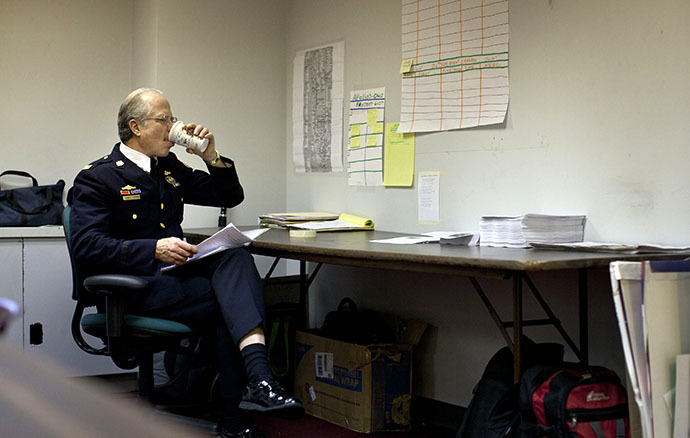
"Corporate America now wants to make a police industrial complex..."
RT:Okay Captain, last question. Shootings at schools, shopping malls, movie theatres, we’ve seen those headlines all around America and internationally. Will this type of equipment be able to stop such crimes from taking place?
RL: Absolutely not. These crimes are committed by people who never would think, ‘oh wait, should I not do this because the police have high caliber weapons?’ No. That doesn’t stop those mass killings at all. Number one, they know most likely they will be killed by the police, or they take their own lives. So this type of equipment will never stop that. Lastly, I want you to know that corporate America is involved in this. This is a major money market that will sell this high (grade) equipment, repair and maintenance for it will come from taxpayers’ money. Corporate America will make billions off of this equipment. You’ve heard of the prison industrial complex, you’ve heard of the military industrial complex, corporate America now wants to make a police industrial complex, where they’ll makes billions off of police departments.
For more, watch Marina Portnaya's Report: Home Front













